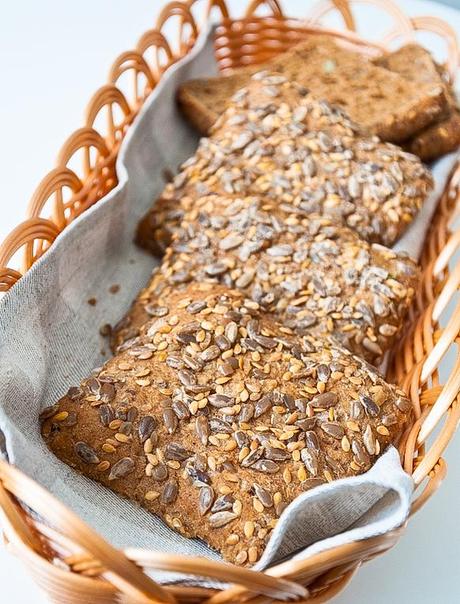
Should you “go gluten-free”?
That’s a question I hear a lot, especially since gluten-free foods are everywhere.
There is gluten-free bread, pasta, cookies, cakes, cupcakes — the list could go on and on! So is gluten-free the newest fad diet or is there really something to it?
My answer is: it depends.
Whether or not a gluten-free diet is right for you depends on one of three scenarios:
- If you have been diagnosed with celiac or are gluten-intolerant
- If you want to avoid sugar (for weight loss, diabetes or general health)
- If you have tummy troubles and want to try something new
But before I get into that – I want to address: What is gluten? And what products have gluten in them?
The short answer: Anything with wheat in it has gluten in it.

Gluten is the protein found in all wheat grains (including barley, semolina, rye, and spelt – among others). Gluten gives dough its elasticity and its yummy, fluffy, chewy texture. That freshly baked bread texture – that is all gluten. Oats, while technically gluten-free, are often processed in facilities that also process wheat – so they become cross contaminated and can’t be considered “gluten-free,” unless they are labeled as such.
Obviously foods like: bread, pasta, cookies, cakes, muffins, pies, cereals, pizza, pretzels, etc. have gluten in them. But there is gluten hidden in lots of other foods like: blue cheese, oatmeal, soy sauce, seitan (which IS gluten), chutneys, sauces, instant coffee and even some curry powders!
It’s easy to see why a gluten-free diet is one of the new “diets” out there – cutting out all of those delicious baked goods would help with weight-loss — since most of those foods are calorie-dense and easy to indulge on!
So now, back to the question: should you be avoiding all of these foods?
If you fall into…
Scenario 1: You suffer from celiac disease or are gluten-intolerant. That means you should be going 100% gluten-free, 100% of the time.
About 1% of the population suffers from celiac disease, a “serious digestive and autoimmune disorder that results in damage to the lining of the small intestine when foods with gluten are eaten” (source: WebMD). For people with this condition, going 100% gluten-free is the only treatment option. Some people aren’t diagnosed with celiac disease but do have allergic reactions or intolerant reactions to gluten (achy joints, rashes, nausea, bloating, etc.) — and going gluten-free can be beneficial for them as well if it alleviates their symptoms.
If you fall into…
Scenario 2: You want to avoid sugar (for weight loss, diabetes or general health). That doesn’t necessarily mean you have to go gluten-free.
If you don’t see any digestive problems when eating gluten products, then there is no real reason to go 100% gluten free. But – if you want to cut back on your sugar intake, eating less refined / high glycemic products will be helpful. And with that could come avoiding wheat and all of the more “junky” gluten products like baked goods, pastas, etc.
But be careful – don’t just eat a “gluten free muffin” instead of a “regular muffin” – you will likely still be getting all of the fat, calories, and carbs from the gluten free muffin — but it’ll have less fiber and may even be more processed to achieve the same muffin-like texture without wheat flour. Instead, try switching to whole wheat or sprouted wheat products, and eat less of them throughout the day. Swap out high sugar drinks and desserts for water, dark chocolate, and healthy snacks like apples and nut butter. That way you’ll be going partially gluten-free, but not so extreme that it will be hard to sustain long term.
If you fall into…
Scenario 3: If you have tummy troubles and want to try something new. Then you should try a gluten-free diet and see how you feel.
Lots of people have undiagnosed “tummy troubles” – and if you’re one of those people, doing an elimination diet and avoiding gluten might be a way to see if you have a sensitivity to it that hasn’t been detected yet. Basically, what you do is start with eliminating gluten 100% from your diet for a couple weeks. Then slowly add gluten back in and see if you feel worse, better, or feel no change. That way you can gauge whether gluten is, in fact, the culprit for your tummy troubles.

So what’s the bottom line – should you go gluten-free?
It all depends on your particular situation and health needs. Be sure to talk to your doctor first. Then try it out and see how you feel. You may not notice a difference at all, or you may end up feeling amazing – better than you have in years. If you’re trying to lose weight, focus on achieving a balanced approach versus cutting out one type of food altogether. Of course, there’s no “one-size-fits-all” diet, so knowing your own body and your own needs is essential to staying healthy and choosing the best plan for you!
Have any of you gone 100% gluten free or have started avoiding gluten? How has it worked for you?

